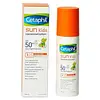What's inside
What's inside
 Key Ingredients
Key Ingredients

 Benefits
Benefits

 Concerns
Concerns

 Ingredients Side-by-side
Ingredients Side-by-side

Methylene Bis-Benzotriazolyl Tetramethylbutylphenol
UV FilterC12-15 Alkyl Benzoate
AntimicrobialDibutyl Adipate
EmollientDicaprylyl Carbonate
EmollientPentylene Glycol
Skin ConditioningDimethicone
EmollientAlcohol Denat.
AntimicrobialCetyl Phosphate
EmulsifyingGlycerin
HumectantCetyl Alcohol
EmollientTriethanolamine
BufferingPanthenol
Skin ConditioningTocopherol
AntioxidantLecithin
EmollientDecyl Glucoside
CleansingCarbomer
Emulsion StabilisingPropylene Glycol
HumectantXanthan Gum
EmulsifyingBHT
AntioxidantAloe Barbadensis Leaf Juice
Skin ConditioningMethylene Bis-Benzotriazolyl Tetramethylbutylphenol, C12-15 Alkyl Benzoate, Dibutyl Adipate, Dicaprylyl Carbonate, Pentylene Glycol, Dimethicone, Alcohol Denat., Cetyl Phosphate, Glycerin, Cetyl Alcohol, Triethanolamine, Panthenol, Tocopherol, Lecithin, Decyl Glucoside, Carbomer, Propylene Glycol, Xanthan Gum, BHT, Aloe Barbadensis Leaf Juice
Water
Skin ConditioningHomosalate
Skin ConditioningOctocrylene
UV AbsorberDibutyl Adipate
EmollientButyl Methoxydibenzoylmethane
UV AbsorberEthylhexyl Triazone
UV AbsorberButylene Glycol
HumectantC12-15 Alkyl Benzoate
AntimicrobialMethylene Bis-Benzotriazolyl Tetramethylbutylphenol
UV FilterSilica
AbrasivePolyglyceryl-3 Methylglucose Distearate
EmulsifyingTapioca Starch
Bis-Ethylhexyloxyphenol Methoxyphenyl Triazine
Skin ConditioningGlyceryl Stearate
EmollientPhenoxyethanol
PreservativePotassium Cetyl Phosphate
EmulsifyingAcrylates Copolymer
Decyl Glucoside
CleansingCaprylyl Glycol
Emollient1,2-Hexanediol
Skin ConditioningTriethanolamine
BufferingHydroxyacetophenone
AntioxidantPolymethylsilsesquioxane
Disodium EDTA
Tocopheryl Acetate
AntioxidantDecylene Glycol
Skin ConditioningPropylene Glycol
HumectantXanthan Gum
EmulsifyingSodium Carrageenan
Emulsion StabilisingSodium Chloride
MaskingWater, Homosalate, Octocrylene, Dibutyl Adipate, Butyl Methoxydibenzoylmethane, Ethylhexyl Triazone, Butylene Glycol, C12-15 Alkyl Benzoate, Methylene Bis-Benzotriazolyl Tetramethylbutylphenol, Silica, Polyglyceryl-3 Methylglucose Distearate, Tapioca Starch, Bis-Ethylhexyloxyphenol Methoxyphenyl Triazine, Glyceryl Stearate, Phenoxyethanol, Potassium Cetyl Phosphate, Acrylates Copolymer, Decyl Glucoside, Caprylyl Glycol, 1,2-Hexanediol, Triethanolamine, Hydroxyacetophenone, Polymethylsilsesquioxane, Disodium EDTA, Tocopheryl Acetate, Decylene Glycol, Propylene Glycol, Xanthan Gum, Sodium Carrageenan, Sodium Chloride
 Reviews
Reviews

Ingredients Explained
These ingredients are found in both products.
Ingredients higher up in an ingredient list are typically present in a larger amount.
C12-15 Alkyl Benzoate is made up of Benzoic Acid and long chain alcohols. It has a low molecular weight.
C12-15 Alkyl Benzoate is an emollient and texture enhancer. Due to its solubility, it is often used in sunscreens to help evenly distribute active ingredients.
As an emollient, C12-15 Alkyl Benzoate helps soften and hydrate your skin. Emollients create a film on your skin that traps moisture within.
This ingredient has been reported to cause eye irritation.
Learn more about C12-15 Alkyl BenzoateDecyl Glucoside is a glucose-based surfactant and emulsion stabilizer. It is created by reacting glucose with the fatty acids from plants.
Surfactants help clean the skin by trapping oil, sebum, and dirt to be washed away. As an emulsion stabilizer, it stabilizes the ingredients in a product by preventing them from separating.
This ingredient is biodegradable and non-toxic. This ingredient is commonly found in baby shampoos.
Decyl Glucoside is sometimes used to stabilize the UV filter Tinosorb.
Learn more about Decyl GlucosideDibutyl Adipate is an emollient and solvent. It is created from butyl alcohol and adipic acid.
As a solvent, Dibutyl Adipate helps mix and disperse ingredients evenly.
Dibutyl Adipate is soluble in water and organic solvents. It does not absorb UV rays.
Learn more about Dibutyl AdipateMethylene Bis-Benzotriazolyl Tetramethylbutylphenol (Tinosorb M) is a hybrid and broad-spectrum UV ingredient. It is both a UV absorber and filter.
UV absorbers are an agent that absorbs UV rays. They protect your skin by using chemical reactions to convert UV rays into heat and energy. UV filters physically reduce the amount of UV rays from reaching your skin.
Tinosorb M covers a range of 280-400 nm and is photostable. This ingredient is neither oil or water soluble.
Tinosorb M is not available in the US. However, it is available in the EU and Asia.
It's sister, Tinosorb S, is set to be approved in the US by late 2025 (fingers crossed!).
Learn more about Methylene Bis-Benzotriazolyl TetramethylbutylphenolPropylene Glycol is an odorless, colorless liquid. As a humectant, it helps skin retain moisture. It also aids in delivering active ingredients.
Another role of this ingredient is preventing a product from melting or freezing. Propylene glycol also adds antimicrobrial properties to a product, elongating product lifespan.
This ingredient is considered an organic alcohol and commonly added into both cosmetics and foods.
Those with sensitive skin or conditions may develop a rash when using this ingredient.
Learn more about Propylene GlycolTriethanolamine is an emulsifier and pH adjuster. It is created using ethylene oxide and ammonia. This gives Triethanolamine a nitrogen core and a similar scent to ammonia.
As an emulsifier, it prevents ingredients from separating and enhances texture by adding volume to a product.
PH adjusters are common in cosmetic products. The pH of a product can affect the effectiveness of other ingredients. A product with a high pH may also irritate the skin.
Learn more about TriethanolamineXanthan gum is used as a stabilizer and thickener within cosmetic products. It helps give products a sticky, thick feeling - preventing them from being too runny.
On the technical side of things, xanthan gum is a polysaccharide - a combination consisting of multiple sugar molecules bonded together.
Xanthan gum is a pretty common and great ingredient. It is a natural, non-toxic, non-irritating ingredient that is also commonly used in food products.
Learn more about Xanthan Gum